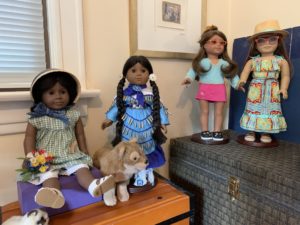I’ve just enjoyed a visit with one of my sisters who lives not far from me. Her home, which she and her husband envisioned and built a few years ago, is an architectural work of art built of glass and wood and native stone. The inside is all light and space for hospitality. When I dropped in, she had just taken delivery on the last element of her interior design: four chairs for the living room. A perfect fit for the style of her home, they are geometric, with shiny metal frames and delicious red fabric cushions. At the moment, she has them draped with “stinger” pads to discourage the dogs—three friendly and rambunctious bull terriers—from claiming them forever as theirs.
As I write this, I’m looking around my own home, which I moved into, together with my new husband, in 2013. There could be no greater contrast in style and sensibility to my sister’s house. In the first place, our house was built in 1908: three stories, Arts & Crafts woodwork, creaky floors, clunky radiators (but excellent hot water heat), and a history of remodels and revisions that hold mysteries and oddities we can barely fathom, whether of usage or of DIY engineering. Furnishings accumulated from each of our earlier lives range from Early American to Stickley to all-purpose Traditional (i.e., a bargain at Wayfair or Costco, a flea market find). For comfort anyway, our home gives Eclectic the best possible definition. The house and its contents hold many old stories.
Clearly, my sister and I both enjoy the enormous privilege of choosing where, and with what objects, we want to live. Some of the objects in our respective homes were inherited from our parents, who, in our formative years, moved us from place to place to place as a military family. Those places included Japan, Libya, Spain, and more than half-a-dozen states. Certain tables, lamps, framed art, figurines, and dishes commemorate those various locations. Indeed, the two of us grew up most of the time with a household décor genially labeled Early Air Force.
Here’s where my mind takes its philosophical leap. Two sisters growing up together (only three years apart in age) have taken very different roads in at least one aspect of life: our surroundings. Do we have divergent experiences and opinions in other ways? Of course. Once in a while, our views collide. But we are good friends. She is relentlessly generous and forgiving. I remain, I hope, open to conversations, even disagreements, that make me think. In truth, hers is the most steadfast lifelong love I know.
We remain, as we have always been, two highly independent women. What are the teachings and the tools, the boundaries and the liberties, which enabled us to become our own unique selves? Well, that would be a memoir of hundreds of pages, which I’m not aiming to write just now.
However, I will say that being encouraged to ask questions, explore options, develop skills, take risks, and move beyond disappointments all added up, from childhood to now. I’ve always figured that the goal of our parents (our mother in particular) was not to mold us but to launch us. And sure enough, off we both went in the trajectory of life, in different directions. Equally good.
By the way, we two sisters have two younger siblings: a sister and a brother. We’re all in our senior years now. And, as you might guess, all four of us lead different lives—different in education, geography, family constellations, work experience, personal challenges, religious persuasion, and more. What’s important, it seems to me, is that we are all alike in character, including the aspiration to goodness, love, and mutual encouragement. Where did we get that?







